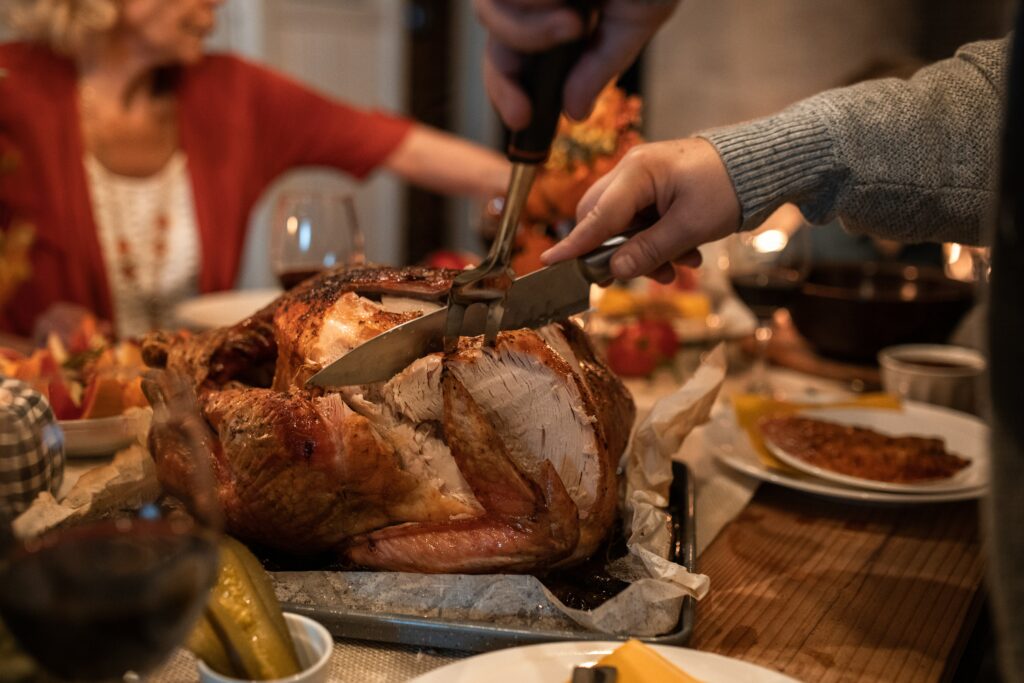
By Ashley Goodfellow Craig, YFile deputy editor
We’ve all done it – felt some regret over one too many gingerbread cookies or a second helping of stuffing and gravy. Rich foods and special treats are ubiquitous over the holiday season, and it’s easy to give in to these short-term temptations. For many, it’s a time to celebrate, enjoy and splurge on treats – but how can we approach this with a practical mindset?
First, we need to understand the science behind the impulse to indulge. Is there a way to give in to food temptations with purpose and intention, so that we don’t over-indulge or continue to indulge over the long term?

York University Professor Jennifer Kuk of the Faculty of Health studies obesity and related health risks and examines the influence of diet and physical activity using both clinical interventions and epidemiological approaches. She says watching what you eat takes practice and effort – but it may be the simple key to managing indulgent food behaviour.
The impulse to indulge, she says, can stem from several triggers, such as stress, cravings and food cues. This explains some of the reasons for eating that have nothing to do with physiological hunger, and why we sometimes eat more than we need.
“Chronic stress is one thing that makes us more sensitive to food cues (i.e. eating more when we see food) and cravings for things like sweets and high fat foods,” she explains. “We also have cravings that are related to food cues (i.e. a peppermint latte at Christmas, or cravings for gingerbread). These are learned behaviours that are linked with our reward pathway in our brain. This is why we crave certain things at certain times of the year and eating these nostalgic treats makes us feel good and happy.
“Given that most of the things we associate with the holidays are high fat and high sugar, this is not good for our waistlines, and the logical part of our brain can only defend against our cravings to a limited extent.”
Her own research shows that people tend to underestimate how much they eat, and overestimate how much they think they should eat – but those trying to manage their weight tend to do better at estimating calories and avoiding overeating.
In the study “Underestimating a serving size may lead to increased food consumption when using Canada’s Food Guide,” published in 2012 in the journal Applied Physiology Nutrition and Metabolism, Kuk and her collaborators found that ”Canadians of different ethnic backgrounds and weight status do not estimate serving sizes accurately” and that the “majority of participants in the study inaccurately perceive that they needed to increase food consumption to meet Canada Food Guide recommendations.”
Part of overeating is learned, and some is our physiology, explains Kuk. “We can’t do a lot to change our physiology, but we can manage our physiology better if we are not sleep deprived or stressed.”
In reference to learned behaviour, Kuk says we should think about what calories are “worth it” and how much we actually need. For example, in reference to the holiday season, we could ask ourselves how big of a gingerbread house do we need and what foods do we actually enjoy?
“Tweaking our traditions so that we are not continually tested is important, as we all have a limited amount of will power, and stress and sleep deprivation will reduce how much will power we have,” she says.
Food is an integral part of holidays and celebrations, and those who are sensitive to overindulging should consider, ahead of time, the best way to limit exposure to temptations and triggers to overeating.

One tactic is to decide before the event or meal how much you need to be satisfied, what food you actually enjoy and want, and plan for the indulging. Prioritize what calories and meals are most important, she offers.
Kuk says people who struggle with their weight tend to gain the most weight over the holiday, and with the large number of celebrations we have in our society, each one pushes the number on the scale a bit higher.
Again, says Kuk, this is about prioritizing what calories and meals are most important and trying to decide beforehand how much you need to be satisfied is an important part of healthy eating all year round.
“Food is a part of celebration. Some of us are more sensitive to overeating. Planning is probably the best way to avoid overindulging,” says Kuk. “If you do fall off the wagon, realize that everyone fails sometimes, and the more important thing is to learn for next time and set a realistic plan in place...”
Another tactic is to limit the situations where you need to use will power to control your eating. Consider your proximity to the food at parties, for instance. Approaching food intake with this mindful forethought will also help create positive and successful eating behaviours year-round.
Here are some tips Kuk offers for those who struggle with overindulging:
- Try to limit situations where you might over-indulge. Are their parties/gatherings that will have a lot of temptations, but not a lot of meaning?
- Stay farther away from the snack table.
- Use smaller plates when you eat. If there is a choice, a smaller plate equals eating less.
- Try to eat slowly.
- Think about how much you need to be satisfied.
- Ask for help if you need it. Having someone to support you can be helpful, but it is something that you need to ask for, and the support needs to be given in a manner that is helpful for the person. Unsolicited comments on eating typically will not be helpful, and we should avoid giving unsolicited comments.
- Do not feel pressure to clean your plate. Listen to your body and eat only enough to be satisfied.
- Liquid sugar calories are added calories. They do not fill you up but can increase the number of calories you eat by a lot.
- Go to sleep on time. Staying up late means temptation for the extra late night snacks where our brains are even more prone to crave high fat, high sugar foods.
